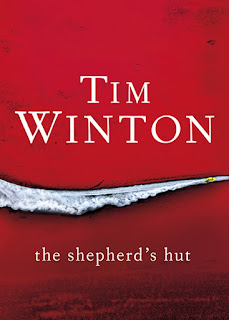The Shepherd's Hut
Tim Winton tells the
story of The Shepherd’s Hut in the
convincing vernacular of a wild boy on the run -- a young man lacking refinement, caught in circumstances
beyond his control. In doing so, Winton conveys deep despair and a search for
meaning and survival in the (coming) apocalypse. So far, the reviews have
focused on the Christian parable in the story, as well as his treatment of
masculinity. I read the novel as a post-apocalyptic tale, as bleak as Cormac
McCarthy’s The Road, which at least
had a father rather than a protective priest as the guide for the survivor in a
fallen world.
The novel opens with Jaxie driving in a vehicle somewhere
outback, alone ‘like [he is] in a fresh new world all slick and flat and easy …
like you’re still on earth but you don’t hardly notice it anymore’ (3). Chapter
2 takes the reader back to ‘the day the old life ended’ (6) – when his father
died and he hit the road, afraid to be blamed for the accident after years of
abuse and violence at his father's hands. Winton’s technique is therefore to
blend the suspenseful story of Jaxie’s escape and survival in a brutal landscape, with Jaxie’s older stories (his life, his love, his hopes
for the future, a certain poetry mixed with the colourful language). Jaxie
walks rather than risks hitching; his supplies near exhaustion until he
finds a hut and manages to kill a euro. Setting out in search of salt to help preserve a second kill, Jaxie comes across the
shepherd’s hut of the novel's title. Fintan MacGillis is the priest-in-residence, whom
Jaxie fears as the worst sort of priest, but slowly, over time, he begins to
trust his companion.
For most of the novel, it is just the two of them, but like
the YA novel of another deadly age, Z for
Zachariah (Robert O'Brien), the fears of surviving on your own -- maintaining traps for food and a water source -- only increases with the discovery
of others. Jaxie wonders what he faces when he discovers signs of
hidden habitation above the giant salt lake near to the hut:
‘I thought of those survival dudes on YouTube with their bunkers full of food and water and
blankets and ammo and everything. Cool setups some of them but those blokes were all nutters,
the same bug-eyed Yanks yabbering about world government or Donald Trump or some
bullshit’ (209).
Jaxie will
one day wonder about ‘a fresh new world’ but in the meantime, he is stuck
trying to survive this one. Whether or not Winton intended the novel to enter
the post-apocalyptic genre in a tale that remains firmly rooted in the
hear-and-now, the fact remains that that outside “civilisation”, our ability to live
beyond a few days of hunger and thirst is fanciful. We all cling precariously
to this rock. Maybe the “survival dudes” have at least this much right. Fintan
has another message, however, the Christian message of redemption others have
noticed. Looking back, Jaxie wonders how Fintan ‘could be so old and lost and
sorry and fucked up and still see so far and clear’ (234). Fintan’s words to his young, rough companion:
When somebody does me a kindness, it enlarges me, adds to my life, see? And not only to mine – it adds to all life … Jaxie Clackton, you are an instrument of God (233).
The fact
that on hearing this Jaxie calls him a ‘mad fucker’ doesn’t stop the
notion of kindness to others from resonating in an angry text. Jaxie’s life has
been one of relentless suffering and torment, and his skin is as hard as a
crocodile’s. Yet Winton gives him the qualities of loyalty and the capability to love. Cold-bloodedness when it is needed. Hard times are coming, and reptiles last
the distance.




Comments
Post a Comment